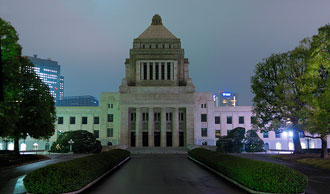The current furor in Japan to push Prime Minister Naoto Kan out of office reminds us that the trappings of democracy can be used to thwart the popular will as effectively as to promote it.
On April 28, 1952, the day the U.S. military occupation of Japan came to a formal end — reverting Japan to the status of an independent nation under a democratic constitution modeled after the Prussian one — Asahi Shimbun published an editorial that complained that the occupation had left Japanese “irresponsible, obsequious and listless . . . unable to perceive issues in a forthright manner, which led to distorted perspectives”.
Nearly sixty years later the Japanese government is still keeping the populace listless and disengaged by working to override the interests of a majority of the Japanese people. Third-world housing, astronomical prices for food and a byzantine distribution and retail system that keeps merchandise prices higher than anywhere in the world are what the government has imposed on the Japanese people for a half century by effectively denying them any possible outlet for change.
In a normal democracy one important avenue of change is the emergence of leaders who espouse views reflective of the popular will. In Japan the leadership role has been neutralized by a system that practically ensures a new prime minister every year or two, regardless of how much the nation may need strong leadership with sufficient continuity to bring about needed change.
A case in point is the current bi-partisan ruckus to drive Kan out of office despite the fact that a recent poll shows that only 19% favor his ouster. If his critics have their way, Kan would be the fifth in a line of one-year prime ministers. During the past forty years only one Japanese prime minister — Junichiro Koizumi — has served three years or longer. In the entire 66-year-history of Japanese democracy only three have served three or more years. As most Americans know, even leaders who serve four years are hard pressed to effectuate major changes.
That’s precisely the point of these annual, orchestrated political lynchings of Japan’s prime ministers — to prevent them from effectuating changes that can disrupt the cozy arrangements built up over time between Japan’s well-paid and deeply entrenched bureaucrats and its major corporations. These arrangements keep certain favored, politically embedded sectors happy and secure at the expense of the vast majority of Japan’s consumers.
Farmers, the construction industry, distributors and retailers, and the energy monopolies are well protected from foreign competition and evolving consumer sentiment against the use of nuclear power. It was only the outrage unleashed by victims of the Fukushima nuclear crisis that allowed Naoto Kan to push for the shutdown of the Hamaoka nuclear plant and hold Tepco to a higher standard of disclosure.
It was also the Fukushima crisis that gave Kan the political impetus to announce the need to shift Japan’s national energy strategy from a growing dependence on nuclear power plants toward building up renewable energy from their negligible 1% share to 20% within a dozen years. To help take on the entrenched power industries he forged an alliance with green activists and recent convert and telecom tycoon Masayoshi Son to spur the breakup of the giant utilities that had been enjoying such cozy relationships with Japan’s government bureaucrats.
That was when the no-confidence motion was taken up. Kan was becoming too much like a leader who might actually maneuver Japan into fundamental changes that the entrenched special interests wanted to avoid. Time for a new prime minister!
For the time being Kan has managed to defuse a no-confidence vote by making a vague pledge to step down after the immediate nuclear crisis has been resolved. But now even members of his own party, including predecessor Yukio Hatoyama, are crying foul, saying that Kan has no right to stay in office longer than necessary to help pick a successor.
“It defies common sense that a prime minister who has said he would step down staying in power without making clear when he will leave office,” chimed in a recent Asahi Shimbun editorial. “Such behavior only deepens public cynicism about politics.”
It’s a telling indication of how distorted Japan’s so-called democratic system has become that even the main opposition party, Kan’s Democratic Party of Japan — formed in 1998 to oppose the stasis and corruption wrought by a half century of LDP’s cozy brand of politics — has joined the chorus of voices seeking to snuff out another nascent effort at leading Japan toward change.
As much as certain segments of Americans have been harping on China’s lack of democracy and human rights, Japan’s monolithic stasis machine disguised as a democracy remains a much bigger detriment to U.S. interests. If Japan had a true democracy that actually reflects the will of Japanese consumers, it would be a far more important customer of U.S. exports and services than it is. While China is at least undergoing rapid transformation toward a vibrant consumer economy, Japan remains stuck as a special-interest-dominated feudal system calculated to keep outside influences from bringing about change.

